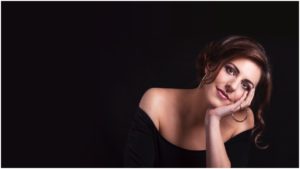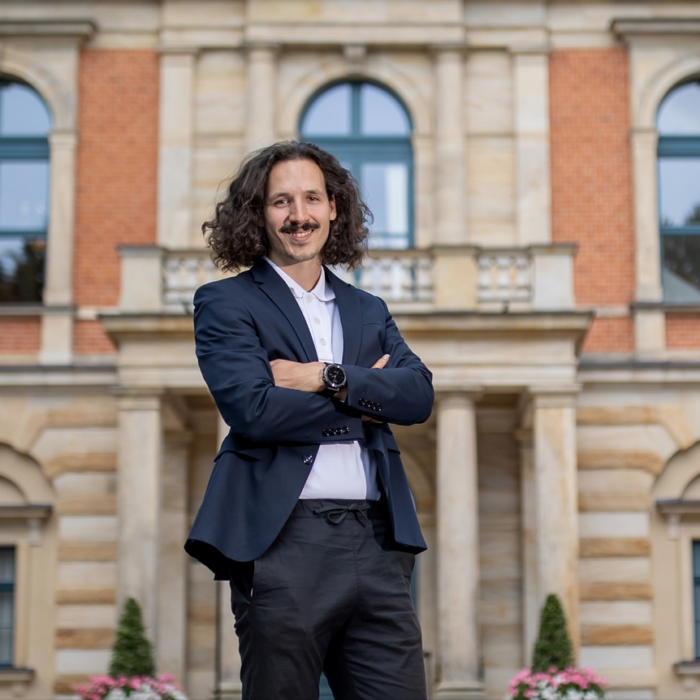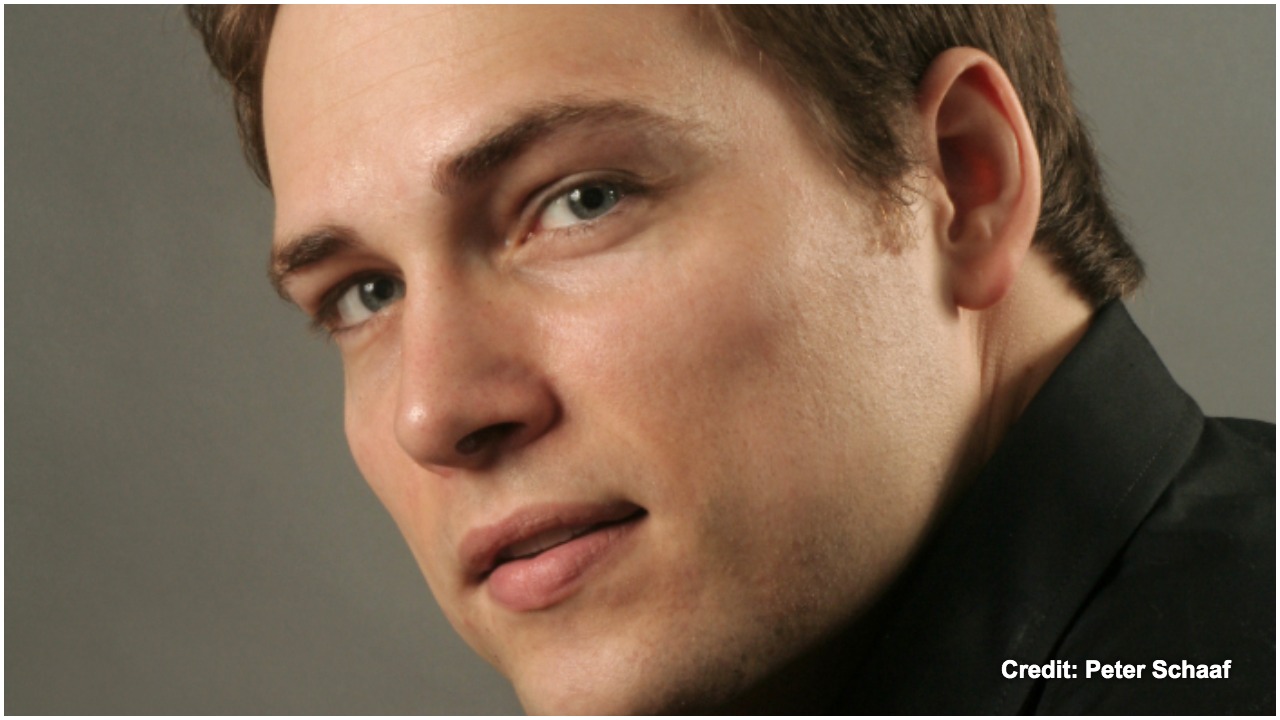
Q & A: Valentina Mastrangelo on her Upcoming Debut at Wexford Festival Opera & Working With Graham Vick
By Alan Neilson(Photo: Marina Andrenucci)
With Wexford Festival Opera about to start its 70th season, OperaWire thought it would be a good opportunity to interview one of this year’s star singers. Fortunately, we were able to catch up with the Italian soprano Valentina Mastrangelo the day before she flew to Ireland to start rehearsals. She will be appearing in the role Olivia in Ambroise Thomas’ opera “Le Songe d’une Nuit d’Étè” as well as giving one of the popular lunchtime recitals at St. Iberius’ church. Mastrangelo has an established career with a growing reputation in Italy and across the continent, playing a variety of roles, in which she has received glowing reviews.
It was an interview that was supposed to have lasted an hour but ended up taking much longer, such was her enthusiasm in engaging with the questions, in which her facility for recounting incidents and stories from her life was captivating. Although time and space limit the amount that can be related here, a sense of her positivity and determination can be clearly gleaned, especially in her reflections on working with the English director Graham Vick, who died earlier this year, and on working as a music therapist with Alzheimer’s patients before becoming an opera singer.
OperaWire: What is your background and what was your pathway into becoming an opera singer?
Valentina Mastrangelo: When I was five years old I started to learn classical dance, and this was my first experience of classical music. I started learning piano when I was ten, which I continued with until my fifth year at the conservatory, then I switched to singing. I have always loved acting, and from an early age I was part of the “Neapolitan Comedy Theatre Company,” so when I was 20 I decided to take this a step further and started to study experimental theatre at the “Hipocrytes Ateneo Studio” at the University of Salerno, where I stayed until I was 25. I remember on one occasion I had to appear almost completely naked hanging from the ceiling. But, it was great fun, I loved it, and at this point, I did not think I would become an opera singer.
Although I was studying singing at the conservatory my parents saw this as no more than hobby and they wanted me to go to university, so I enrolled for a degree in archaeology at the University of Rome. It was a busy time for me, I was simultaneously studying singing at the Salerno Conservatory, archeology and music therapy at the University of Rome, as well as acting in Salerno. By the age of 26, I had completed all my studies, and I started to train and work as a music therapist with the Alzheimer Foundation in Rome in a team helping old people. But I still pursued the possibility of a career as an opera singer, and in 2012 I debuted the role of Scintilla in Donizetti’s “Il campanello,” and then in 2013 I attended the Rossini academy of Pesaro, debuting in the role of Madama Cortese in “Il viaggio a Reims.” In 2014 I won the Aslico di Como competition. But a career in opera was still in the balance.
My actual springboard into a full-time opera came about because of an incident that occurred at work, in what was a life-changing event. I had been there for two years and nobody in the center had heard me sing. This is not how music therapy works, you cannot impose your music on the patients, you have to work with them. Then one day, one of the patients, who actually never spoke as he was an elective mute, suddenly said “sing,” so I did. At the time, I was still pursuing singing as a hobby, and studying with Renata Scotto. As I was learning the aria “Ah! Non credea mirati” from “La Sonnambula,” I sang that, and the patients started to cry. The man who had asked me to sing then said to me “Why are you here and not in the theatre?” The response from my boss was to sack me on the spot. He told me that if I had not succeeded as a singer in three years, I could return and he would give me my job back. He was totally serious. He fired me. Fortunately, everything worked out well and we are still great friends!
OW: Which singers have had the biggest influence on you?
VM: There are so many singers who I admire. Obviously, Callas is one, and I love the color of the Romanian singer Virginia Zeani’s voice. In Italy, there have been so many singers who have influenced me, such as Barbara Frittoli, and I love the clean sound of Mariella Devia’s voice. There are so many it would be impossible to name them all.
OW: At this year’s Wexford Festival Opera you are playing the role of Olivia in Ambroise Thomas’ “Le Songe d’une Nuit d’Été.” Can you tell us about the role, and what audiences can look forward to?
VM: The opera is a comedy based on Shakespeare’s “A Midsummer Night’s Dream.” Olivia is Queen Elizabeth’s closest friend and is always on hand to give her advice, sometimes assertively so, as she wants to protect her. She sees herself as her Guardian Angel. On occasions, they dress up in disguises and wear masks and go to pubs and taverns to have some fun. However, a love interest inserts itself into Olivia‘s life in the form of Latimer, which causes the plot to take a complicated turn in which she becomes conflicted between her love for Latimer and her loyalty to Elizabeth. At one point Olivia loses a bouquet of flowers that Latimer has given her, which he takes as a sign she does not love him. This precipitates a duet, which for me is the centerpiece of the opera. It is a very passionate piece with her pleading fidelity and Latimer claiming she has a duty towards him. He then offers her his mother’s ring, which shocks her, and Latimer takes this to mean she does not want it. He storms off in one direction, she in the other, worried in case she does not see him again. She is now so distraught she ends up having a row with Elizabeth and tells her to “shut up.” Of course, at the end of the opera Latimer realizes the truth and they are united. The last thing she says to him is “You can keep the ring, you will give it to me when we marry.”
It is great to be part of this opera. I really love it, and I love the character of Olivia. One of the reasons I am so thrilled about it is that when I was five years old I went to the amphitheater in Taormina in Sicily with my parents, where I saw a production of Shakespeare’s “A Midsummer Dream.” I fell in love with Titania, the Queen of the Fairies, and I remember saying to my mother “I want to stay with her.” So here I am in Wexford, living out one of my childhood dreams!
At the moment, I have no idea how the director is going to stage it. It will be a surprise.
OW. You will also be giving a lunchtime recital at St. Iberius’ church. Have you decided what you will be singing yet?
VM: The festival asked me to perform salon pieces, or works suitable for a lunchtime audience in a small venue. So I have created a program that is almost completely dedicated to the songs of the 19thcentury Italian composer Francesco Tosti. I chose his program because a few years ago I recorded a CD of his songs on the Brilliant label, so I know them well, and it will be an excellent opportunity for me to revisit them once again.
OW: Which is your favorite stage role?
VM: Tatyana for the reasons I explained, and I also love Tchaikovsky’s music. I actually sing the role in Russian. I learned it so that I could sing the part with good pronunciation. Don’t ask me to speak Russia. I am comfortable singing in the language, but speaking is a totally different matter. I also love playing Donna Elvira from “Don Giovanni” because it suits my voice perfectly, which leaves me free to concentrate fully on my acting.
OW: How would you describe your voice?
VM: I am a lyric soprano. It has a sweet color and it is very agile, so I can sing roles from Rossini to Puccini and from Mozart to Tchaikovsky. I have been offered many diverse roles in my career and I think this reflects how versatile my voice can be. It is also a voice that is able to fill big spaces, and so I am able to sing in large venues like Macerata.
OW: How have the measures taken by governments and theatres to prevent the spread of COVID over the past 2 years affected your career?
VM: I had four performances of “The Magic Flute” canceled at the Teatro San Carlo in Naples, although we did manage to do one recorded performance in September. I also had my debut performance as Liu in “Turandot” canceled in Florence, which was disappointing as I was really looking forward to performing the role. It was to have been conducted by Valčuha. But now it has gone.
I had a “La Boheme” canceled in Switzerland. They were very kind to me. I had six shows scheduled and they paid me for all six. The artistic director of Basel Opera sent all the performers an email saying “You can rest for a little while, all your payments will be covered in full, because after Covid the public will need art.” I was also lucky that last year the Macerata Opera Festival was open to the public, in which I was able to play Donna Elvira in “Don Giovanni.” A review of it actually ended up in “The Times” as it was one of the few summer festivals to go ahead.
So for me, COVID was not too bad. I only stopped work completely for two months. For young singers, however, it has been a disaster. A whole generation of singers simply left the profession and switched to a new career. There was no work for them. I know singers who had to leave their homes and return to live with their parents, as they just did not have enough money to live on.
OW: Earlier this year the director Graham Vick sadly died of a COVID-related condition. You worked with him on a number of occasions. Can you describe what it was like working with him?
VM: He liked to challenge you. The last production I worked on with him was “La Boheme” in Bologna. I was playing the role of Musetta, who he had decided I should play as a prostitute. He could see that I was not happy in having to play Musetta in this way, and I admit I did not like the idea at all. “La Boheme” was not a new experience for me, and I always try to give something of myself to the character, and Vick said to me “It is my Musetta, not your Musetta! I want you to sit there with your legs open, drunk, drugged up, and be disgusting. I don’t want you to be you!”
This was his way, he always wanted to challenge you, and I always did my best to do what he wanted. It could be very difficult, but it was also fulfilling. To understand him, I will tell you about our final meeting. It was May 28, 2021. We had just finished the final rehearsal, and the following day was my mother’s birthday, so I asked him if it was okay to return home to celebrate with her. He was not happy at all and told me that my Musetta was almost complete. So instead of going home for my mother’s birthday, he brought me back in with both the first and second casts. Everyone had to remain because of me, and they were very, very unhappy. No one would look at me and I was really angry. He then asked me to watch the other Musetta perform with the second cast. She was different from my Musetta, he had created her in a different way and I asked him “Why do you want me to see this?” I was staring at him in a very unpleasant and impolite way, and said “You don’t trust me!” To which he replied “It is because I do trust you that I will give you another chance,” and then dismissed the other cast and brought on the first cast, and made me do it again. I was so angry, really mad, I hated him. He was taking my soul from me. I came on the stage in such an emotional state. I was acting in such a drunken way that I could hardly walk. I was wearing big boots, and when I sat down I put my feet on the table and treated Benoit very badly. I even called over the waiter and slapped him on his backside, and when it came to the aria “Quando m’en vo” I gave it everything in the style of a showgirl, at which Vick screamed from the stalls “Yes! Well done, this is my Musetta. We are finished. Go.” and that was the last time I saw him.
This is what he did to people whom he believed in. I remember a young, very talented bass, and Vick used to fix his eyes on him and just stare at him every day, then one day asked him “Why are you acting like this? You ruin all the scenes.” Every time he would come on to the stage Vick would stop everything. He always acted like this when he saw something in a person which he wanted to bring out. He destroyed them and then rebuilt them. If there is nothing inside you, then he just destroyed you and moved on. Yes, it could be very difficult working with him. I remember when I was working on “Don Giovanni” with him, I lost five kilos in one month. Yet, whenever I found that I would be working with him I was always happy. He was an inspiration, a genius. He would shape the characters down to the smallest detail, yet never tell you exactly what to do, such as here you must pick up this glass. You had the freedom to do what you wished, providing it was in the character he was shaping, and he was always encouraging you to improvise.
OW: You are scheduled to perform Hanna from “The Merry Widow” in Genoa this December, and Tatyana from “Eugene Onegin” in Hannover next May, both roles you have performed before. What is it you enjoy about performing them? Do you resemble either of the characters?
VM. I love Hanna, she is amazing. But she is not like me at all. She is far, far away from my personality and that is why I love the role. I much prefer singing characters who are nothing like me.
But I do think I was like Tatyana when I was young. She is a dreamer, she has big hopes for her life, like I did. She also allows sopranos to take revenge on the baritones: they kneel to her, and she just walks away, which I love.
The role which does reflect me, however, is Mozart’s Susanna. She is practical, she confronts problems and tries to solve them by attacking them head-on. She is a big dreamer, but with her feet planted firmly on the ground. She is also someone who is determined to make them a reality.
OW: If you could choose any role to sing, which you have not sung so far, what would it be?
VM: I would love to sing Mozart’s Fiordiligi. I have been studying her for two years now, and it is a role I have to perform.
OW: If you could sing at any theatre in the world, which would you choose?
VM: I would love to sing at the Bolshoi, but not in Russian, in Italian!



